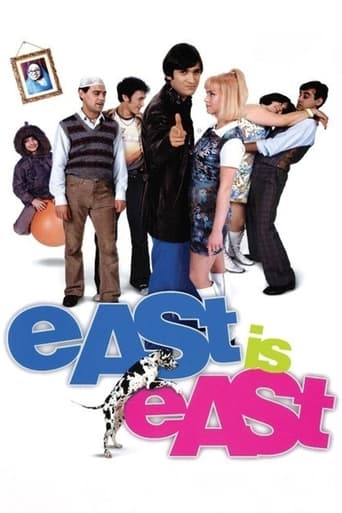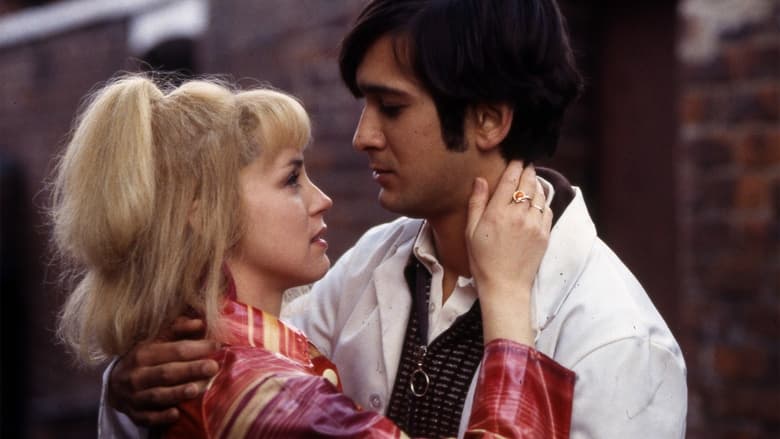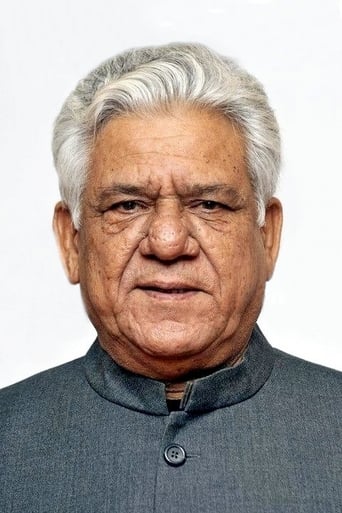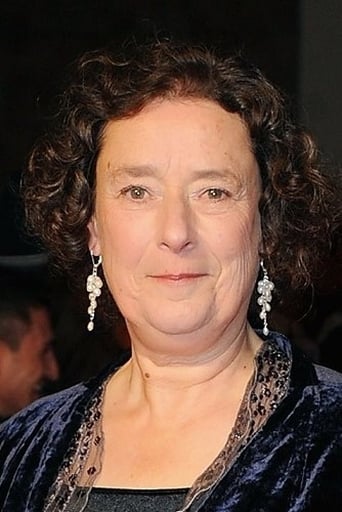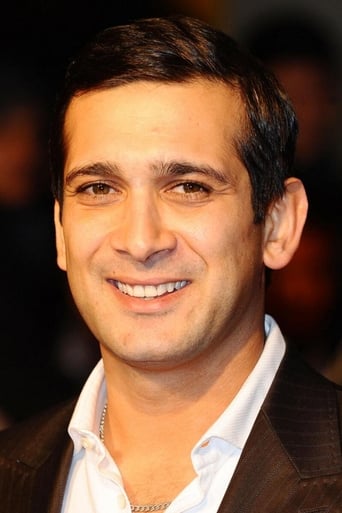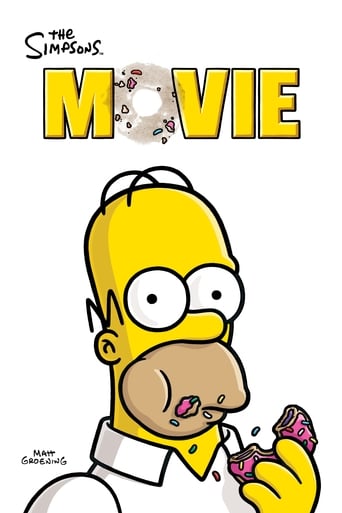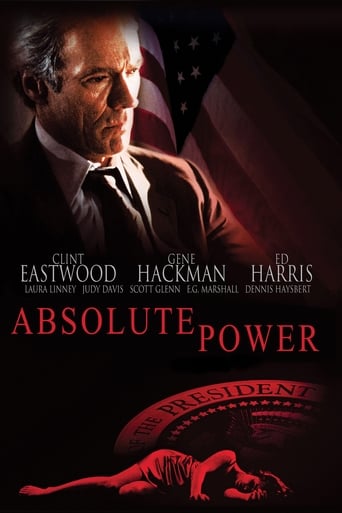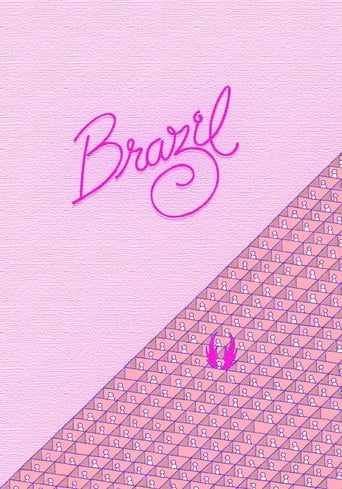East Is East (1999)
In 1971 Salford fish-and-chip shop owner George Khan expects his family to follow his strict Pakistani Muslim ways. But his children, with an English mother and having been born and brought up in Britain, increasingly see themselves as British and start to reject their father's rules on dress, food, religion, and living in general.
Watch Trailer
Free Trial Channels
Cast


Similar titles
Reviews
Wonderful character development!
A very feeble attempt at affirmatie action
I wanted to like it more than I actually did... But much of the humor totally escaped me and I walked out only mildly impressed.
Mostly, the movie is committed to the value of a good time.
The movie East is East was directed by Damien O'Donnelland it was released in 1999. This movie has many cultural motives related cultural clashes of Pakistani people in Britain and British people. In this paper, traditions, customs, habits and beliefs represented in the movie will be discussed. East is East sets in Britain. It tells a story of a Pakistani man named George Khan and his family. When he came to Britain, he didn't have even luggage, he says. He was already married that time, as it is mentioned in the movie. However, he got married to a British woman named Ella. They have their own shop where they sell chips and they live in a small apartment. They have 7 children, 6 boys and 1 girl. There are several cultural aspects showing that the family is patriarchal like many other eastern families. His children are afraid of him and they call him Ghengis Khan. Genghis Khan was an oriental brutal king. That nickname shows how he is strict about the way how his children should be raised. He is a very religious Muslim and he wants to raise his children according to Islamic teachings. For example, he wants his kids to read Quran and go to mosque on a regular basis. Also, he wants his youngest son to be circumcised against his will. He afraids that if they act like English people, they will be corrupted. Also, his biggest dream is to see all his children married with someone from Pakistani families. His elder son rejects this marriage and on the day of wedding and the father disinherits him. Starting from that day, he says his elder son is dead. The mother, Ella is affectionate and secretly she and her other children makes phone call to talk to him. After that, He keeps arranging family meetings with other Pakistani families to arrange any engagements for his grown children's marriage. However, children are not aware of all these meetings. For example, his two sons Salim and Tariq will be engaged with two daughters of a Pakistani man called Mr Shah. However, they don't want to marry Pakistani girls and they already have English girlfriends, but they just can't tell their father about this. His wife, Ella, can't stop him being so harsh on their sons and daughter. Towards the end of the movie, George beats his wife because she doesn't listen to his decisions. That is a very strong and clear implication of a patriarchal family. The kids can't help or protect their mother because they are also afraid of George. This fear creates a hate towards their father as Tarıq, one of his sons, talks behind his father harshly. However, his mother warns him by saying that even though George did something wrong and he is guilty, he is their father and it is also wrong to talk badly about George. This shows a submissive woman figure in Islamic societies. Even though Ella is not a Muslim, George, who is Muslim, is considered to be the patriarch and breadwinner of the family. There are also some patterns representing how Pakistani people arrange their weddings and how they decide where the new-married couple will live. As aforementioned, George wants his sons, Tarıq and Salim, to marry 2 girls from a Pakistani family. When this family comes over their home two sides talk about a tradition suggesting that newly-married couples should stay with the groom's family after the wedding. Secondly, during their wedding, Pakistani people wear colourful special dresses. Adult men wear skullcap, which they may wear daily as well. To conclude, the movie East is East is a great work of art. It is informative as it represents Islamic values, traditions and Pakistani culture from many perceptions especially the family life and social structure of these societies with the combination of an environment, Britain, to which these values are strange.
"East Is East" can be seen as a return to the tradition of "kitchen sink realism", which was responsible for so many fine British films in the fifties and sixties. It has a number of similarities with one of the last of those films, "Spring and Port Wine". Both films are set in industrial towns in Lancashire (Salford here, Bolton in the earlier film). Both are set in the same period, the late sixties/early seventies. And both are centred upon a strict, autocratic father who finds his authority being challenged by rebellious children. There are, however, two major differences. One is that the action of "Spring and Port Wine" took place around the time it was made, whereas "East Is East" is a period piece, made in 1999 but set in 1971. It relies heavily on nostalgic period detail, featuring the fashions, pop music (The Hollies), television ("The Clangers") and even toys (spacehoppers) of the era, although there are a couple of errors. Enoch Powell, for example, is seen on television referring to Alec Douglas-Home as Conservative Party leader (he resigned from that office in 1965) and there is a reference to the half-crown, a pre-decimal coin which ceased to be legal tender after 1969. The other major difference is that "East is East" revolves around the question of race, something that was quite absent in "Spring and Port Wine". The father in this case is Zahir "George" Khan, the Pakistani Muslim owner of a fish-and-chip shop, who has lived in England since 1937. He is married to Ella, a white British woman, and they have seven children, six sons and a daughter. (There may, in fact, be some doubt about the legitimacy of their marriage under English law; we learn that he has a first wife still living in Pakistan, from whom he has never been formally divorced). The film starts with the oldest son Nazir refusing to go through with an arranged marriage, leading Zahir to disown him. (We later learn that Nazir is in fact gay). With the exception of Maneer, who is a devout Muslim, the remaining children, who were born and grew up in Britain, see themselves as British rather than Pakistani, and resent their father's insistence that they should follow Pakistani customs of dress, food and religion. Some of them, for example, go so far as to drink alcohol and eat pork, but always behind their father's back. It should be noted that Zahir does not always follow his own precepts; he is generally known as "George", but has given all his children Muslim names and his sons Abdul and Tariq have to hide from their father the fact that among their English friends they are generally known as "Arthur" and "Tony". (Nazir goes by the name "Nigel"). Similarly, although George has himself married a white woman he would be horrified to know that Tariq has a white girlfriend. There have been a number of other recent comedies about the Asian immigrant communities in Britain and their relations with the indigenous British community- "Anita and Me" and "Bend It like Beckham" are two other examples which come to mind- but "East Is East", based on a play by Ayub Khan-Din, himself of Asian ancestry, takes a harder, more critical, look at Asian culture, especially at practices such as arranged marriages. Rafe Crompton, the central character of "Spring and Port Wine" had, for all his strictness as a father, a basic decency and kindness which enabled the Crompton family to stick together when threatened by crisis. George, by contrast, is an overbearing domestic tyrant who bullies his children and beats his wife when she tries to stand up for them. He even assaults the normally loyal and obedient Maneer. He resents the racist attitudes of his English neighbours, but displays similar prejudices himself, against Hindus ("cow-worshipping bastards!") and even against his fellow-Muslims from East Pakistan, as Bangladesh was then known. ("Bengali baboons!") Imagine the furore which would have been unleashed had epithets like these been uttered by a white character. At times he resembles not Rafe Crompton but an Asian version of Alf Garnett, the monstrous anti-hero of "Till Death Us Do Part". Ayub Khan-Din took his title from a poem by Kipling, "East is East and West is West, and never the twain shall meet". Kipling's theme was the differences between Eastern and Western culture, so the title is appropriate to a film on the same theme, although since Kipling write these lines East and West have indeed met in all sorts of ways he never dreamed of. In the context of the film, in fact, the implication is that when East and West do meet there should be some two-way cultural exchange, a suggestion that it is in nobody's interests for immigrant communities to try and live in some sort of monocultural ghetto, rejecting Western influences, as George is trying to. "East Is East" is sometimes described as a comedy, and there are certainly a number of amusing scenes, such as the ones in which George- who clearly has not learned his lesson following the debacle with Nazir- tries to arrange marriages for Abdul and Tariq to the two daughters of a Pakistani family from Leeds, despite the fact that the girls are fat and ugly, their father rude and arrogant and their mother a monstrous snob. If it is a comedy, however, it is a rather bleak and bitter one; George is a deeply unpleasant individual and we are left uncomfortably aware that attitudes like his could all too easily lead to tragedy. If we laugh at him, it is a very uneasy form of laughter indeed. 7/10
East is East, a culture-clash comedy set in the 1970s is a great film. It is thoroughly accessible, and while it never takes itself too seriously, it still manages to be a funny, charming, poignant and refreshing film. It does start off a little slow, but the performances, script and story more than make up for it. The script is constantly funny, yet has a sense of poignancy as well, and the story is surprisingly compelling about Asian integration in Britain.And the performances are really very strong, Om Puri especially gives a powerful one as the patriarch of the family, while he loves his family very much the tradition he is part of makes him a very strict father. Linda Bassett is great as his wife, and out of the equally strong younger performances, Jimi Mistry really stands out. The boys yearn for freedom, and are resistant to the life their father wishes them to lead.All in all, great film that breaks the mould for films similar to it. 8/10 Bethany Cox
The movie "East is East" mainly shows the difference between Parkistani and European families.One of the main characters George Khan is the father of the family which clarifies this difference the most.He is cleaved between the love to his family and teaching his children the Parkistani life. But this isn't so easy easy it seems, because nearly every member of his family has his own way to dispute the Parkistani life. This is already point up at the beginning,when the oldest son "Nazir" runs away from his wedding,by the reason that he is gay. As well his brother "Tariq" is the rebel of the family, he fights against that, what his parents want him to do. Also Saleem another son, is a art student,what is against his fathers idea to become a Ingeneur. Maneer seems to be the only child of the seven, which stands behind his father. So it is shown, that nearly everybody of the Khan family isn't a perfect Parkistani. In fact of that, it isn't an astonishment, that at the end of the film happens a big conflict with George Khan ,where everybody fights against them, till the very surprising end. I think the film is great to show the difference of the Asian culture in the family aspect.There is a good suspense and every time there happened a new mistake , which shouldn't happened in a Parkistani family!

